Lose 40 LBS In 21 Days
Strategies For Weight Loss

Learn about the global obesity epidemic and strategies for weight loss, including diet plans, exercise, medications, and surgery, in these informative articles.
Weight gain is a common problem worldwide. With the increase in sedentary lifestyles and the consumption of high-calorie processed foods, more and more people are struggling with weight gain and obesity. This can lead to a variety of health problems such as diabetes, heart disease, and joint pain, among others. Additionally, weight gain can also have negative impacts on mental health and self-esteem. Therefore, it is important to maintain a healthy weight through a balanced diet and regular exercise.
The Global Obesity Epidemic
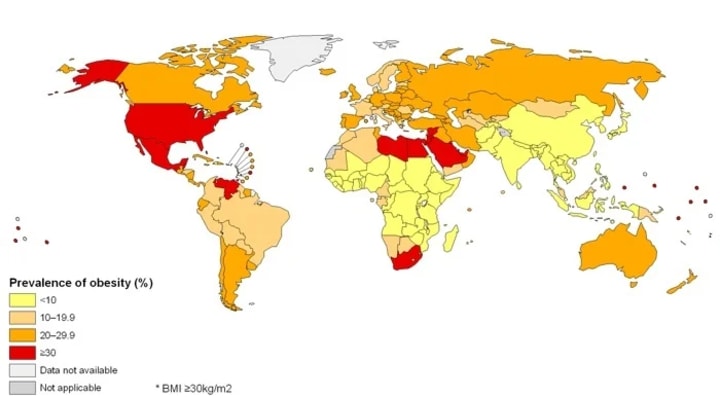
As we enter 2023, the outlook for global obesity rates is bleak. The World Obesity Federation's latest atlas predicts that by the end of this decade, more than 4 billion people, or 51% of the world's population, will be overweight or obese. This is an alarming increase from 2020 when 38% of people worldwide fell into these categories.
The problem is particularly acute among children and in lower-income countries, where rates of obesity are rising the fastest. Shockingly, the report warns that childhood obesity could more than double by 2035. This is a major concern, as obesity is a disease that impacts most body systems, leading to a range of noncommunicable diseases and mental health issues. People with obesity are also three times more likely to be hospitalized for COVID-19.
The cost to society is also significant, with the World Obesity Federation estimating that the health conditions linked to being overweight will cost more than $4 trillion annually by 2035, or 3% of global GDP.
Despite these dire predictions, there is hope. Obesity is preventable, and on World Obesity Day 2022, the World Health Organization called on countries to do more to address this crisis. By focusing on preventative measures like healthy eating, regular exercise, and promoting public awareness, we can work to reverse this trend and improve the health of people around the world.
Factors Contributing to Varied Obesity Rates Across Countries
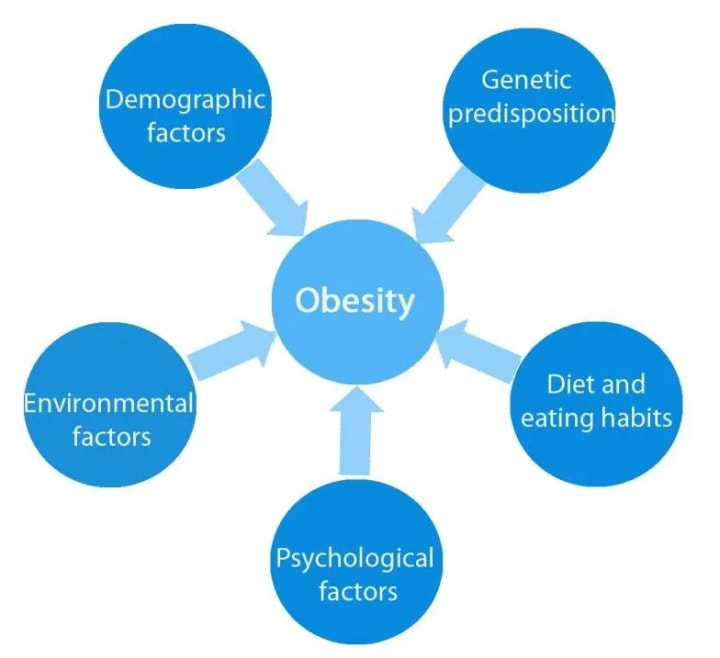
County Having Fewer Obesity Problems and Reason
According to the World Population Review's 2021 data, the country with the lowest obesity rate is Vietnam, with a rate of 2.1%. Other countries with relatively low rates of obesity include Japan (3.6%), India (3.9%), and China (6.2%). However, it's worth noting that obesity rates can vary based on factors such as age, gender, and socioeconomic status within a country.
There are several reasons why Vietnam, Japan, India, and China have relatively lower rates of obesity compared to other countries.
- Diet: These countries have traditional diets that typically consist of fresh fruits, vegetables, and lean protein sources, which are generally lower in calories and fat than Western diets. Additionally, traditional diets in these countries tend to be plant-based and incorporate smaller portion sizes.
- Active lifestyle: Many people in these countries engage in physical activity as part of their daily routine, such as walking or biking to work, which contributes to a more active lifestyle and can help prevent obesity.
- Cultural factors: Cultural factors, such as the importance of family meals and communal eating, can also contribute to healthier eating habits and lower rates of obesity.
- Genetics: There may also be genetic factors that contribute to lower rates of obesity in these countries, although this is still an area of active research.
It's important to note that these are general trends, and there can be significant variation within each country based on factors such as age, gender, and socioeconomic status.
County Having More Obesity problems And Reason
According to the World Population Review's 2021 data, the country with the highest obesity rate is Nauru, with a rate of 61.0%. Other countries with high rates of obesity include the Cook Islands (55.9%), Palau (55.3%), Marshall Islands (52.9%), and Tuvalu (51.6%). It's important to note that obesity rates can be influenced by a variety of factors, including diet, exercise, genetics, and socioeconomic status.
There are several reasons why the Cook Islands, Palau, Marshall Islands, and Tuvalu, have relatively higher rates of obesity compared to other countries.
- Diet: In these countries, diets tend to be high in processed foods, sugar, and unhealthy fats, which are generally higher in calories and can contribute to weight gain and obesity.
- Sedentary lifestyle: People in these countries tend to have more sedentary lifestyles due to factors such as lack of access to safe outdoor spaces for physical activity, long commutes, and reliance on cars instead of walking or biking.
- Cultural factors: Cultural factors, such as the increasing availability and popularity of fast food, can also contribute to unhealthy eating habits and higher rates of obesity.
- Socioeconomic factors: In these countries, obesity rates tend to be higher among people with lower incomes and less education, which can be linked to limited access to healthy food options and lower levels of physical activity.
- Genetics: There may also be genetic factors that contribute to higher rates of obesity in these countries, although this is still an area of active research.
It's important to note that these are general trends, and there can be significant variation within each country based on factors such as age, gender, and cultural background.
Reason For Weight Gain
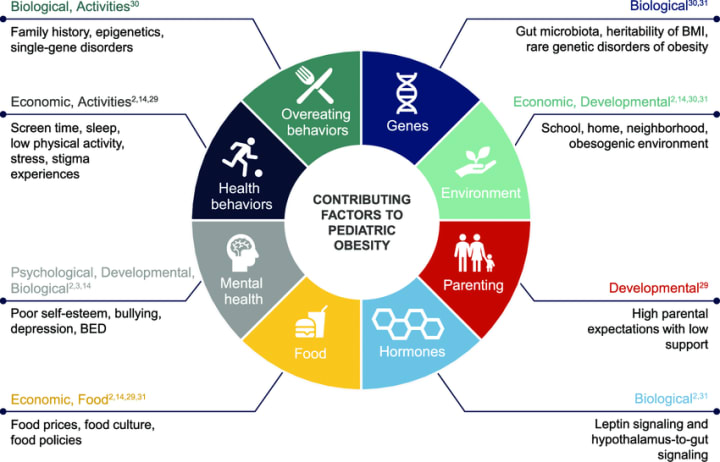
Weight gain can occur for a variety of reasons, and it's not always just a matter of overeating or lack of exercise. Some common reasons for weight gain include:
- Poor Diet: Consuming too many high-calorie, high-fat, and high-sugar foods can lead to weight gain. Processed foods, fast foods, and sugary drinks can be particularly problematic.
- Lack of Physical Activity: Not getting enough exercise or leading a sedentary lifestyle can slow down your metabolism and lead to weight gain.
- Medical Conditions: Certain medical conditions such as hypothyroidism, polycystic ovary syndrome (PCOS), and Cushing's syndrome can cause weight gain.
- Medications: Some medications, such as antidepressants, antipsychotics, and steroids, can cause weight gain as a side effect.
- Stress: High levels of stress can trigger the release of the hormone cortisol, which can lead to weight gain, especially around the midsection.
- Lack of Sleep: Not getting enough sleep can disrupt your hormones, leading to increased hunger and cravings, which can contribute to weight gain.
- Genetics: Some people are more prone to weight gain due to genetics, which can influence factors such as metabolism and fat storage.
Understanding the reasons for weight gain can help develop a plan to address it. By making healthy lifestyle choices, such as eating a balanced diet, staying active, managing stress, and getting enough sleep, it's possible to maintain a healthy weight and improve overall health.
What Are The Major Drawbacks or Problems Related To Obesity
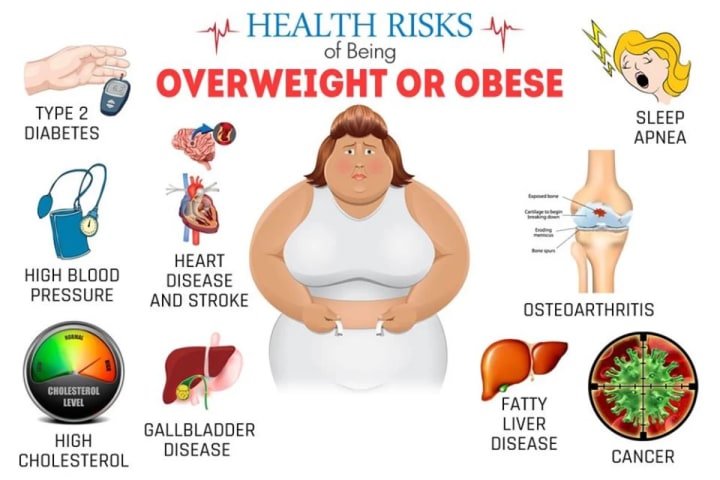
Obesity is a complex condition that has a wide range of negative effects on an individual's physical, emotional, and social well-being. The major drawbacks or problems related to obesity can be categorized into several areas:
- Health problems: Obesity increases the risk of developing several health conditions, including type 2 diabetes, heart disease, high blood pressure, stroke, osteoarthritis, sleep apnea, and some forms of cancer. It also increases the risk of developing complications during surgery and can lead to an overall decreased quality of life.
- Psychological problems: Obesity is associated with a range of psychological problems, including low self-esteem, depression, anxiety, and social isolation. These issues can have a significant impact on an individual's mental health and quality of life.
- Economic problems: Obesity can also have significant economic impacts, including increased healthcare costs, decreased productivity, and increased absenteeism from work. This can lead to financial difficulties for both the individual and society as a whole.
- Social problems: Obesity can lead to social stigmatization and discrimination, which can result in a range of negative social impacts, including decreased access to education and employment opportunities, social exclusion, and decreased quality of life.
Overall, the major drawbacks or problems related to obesity are diverse and far-reaching, affecting an individual's physical, emotional, social, and economic well-being. It is important to address obesity as a serious health condition and take steps to prevent and manage it to improve overall health and well-being.
What Is The Diet or Things Should Have To Avoid or Maintain Obesity Problems
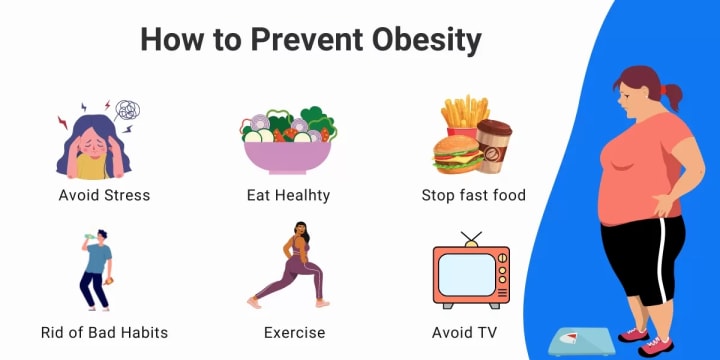
To avoid or manage obesity, it is important to make healthy lifestyle choices. Here are some tips on what to include in your diet and what to avoid:
- Get enough sleep: Lack of sleep has been linked to weight gain and obesity. Aim for 7-8 hours of sleep per night.
- Manage stress: Chronic stress can lead to weight gain and make it harder to lose weight. Try stress-reducing activities like meditation, yoga, or deep breathing.
- Include whole, nutrient-dense foods: Fill your plate with vegetables, fruits, whole grains, lean proteins, and healthy fats. These foods provide essential nutrients and keep you feeling full for longer.
- Avoid processed and high-calorie foods: Processed and high-calorie foods, such as fast food, sugary drinks, and snacks, can contribute to weight gain and obesity. Avoid these foods or consume them in moderation.
- Limit added sugars and sweeteners: Added sugars and sweeteners can increase your calorie intake without providing any nutritional value. Avoid or limit the consumption of sugary drinks, candies, and desserts.
- Drink plenty of water: Drinking water can help you stay hydrated and reduce your calorie intake by replacing sugary drinks.
- Watch portion sizes: Eating large portions can contribute to weight gain. Use smaller plates, measure your portions, and eat slowly to help control your food intake.
- Be mindful of your eating habits: Pay attention to your hunger and fullness cues, avoid distractions while eating, and practice mindful eating to prevent overeating.
- Get regular physical activity: Regular exercise can help you burn calories, maintain muscle mass, and improve your overall health. Aim for at least 150 minutes of moderate-intensity physical activity per week.
Remember, managing obesity requires a long-term commitment to healthy lifestyle choices. Consult with a healthcare professional or registered dietitian to develop a personalized plan that suits your individual needs and preferences.
What Types Of Diet Plans To Lose Weight
Many types of diet plans can be effective for weight loss, but it's important to choose a plan that is sustainable and healthy for the long term. Here are a few examples:
Calorie-restricted diet:
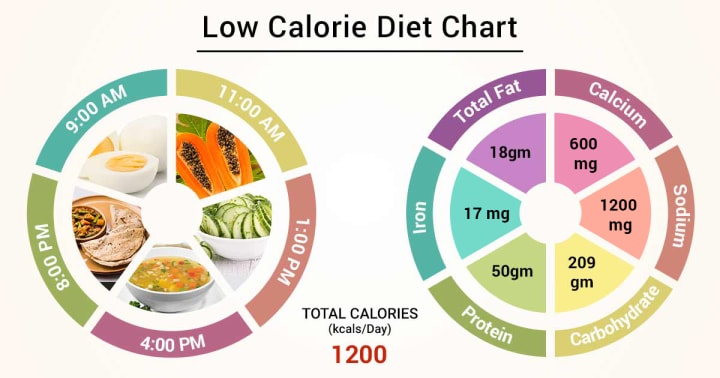
This involves reducing overall calorie intake to create a calorie deficit and promote weight loss. It's important to ensure that the diet is still balanced and provides all necessary nutrients.
A calorie-restricted diet is a type of diet where the individual reduces their overall calorie intake to create a calorie deficit and promote weight loss. This means consuming fewer calories than your body needs to maintain its current weight.
To achieve this, it's important to choose foods that are low in calories but still provide essential nutrients. Examples of such foods include vegetables, fruits, lean proteins, and whole grains. It's also important to avoid high-calorie foods and beverages such as sugary drinks, fried foods, and sweets.
It's essential to ensure that the diet is still balanced and provides all the necessary nutrients. This means including a variety of different food groups in the diet and not restricting any particular food group. A calorie-restricted diet should be planned and monitored carefully to ensure that it is healthy and sustainable in the long term. Consulting a registered dietitian can help create a personalized calorie-restricted diet plan.
Low-carbohydrate diet:
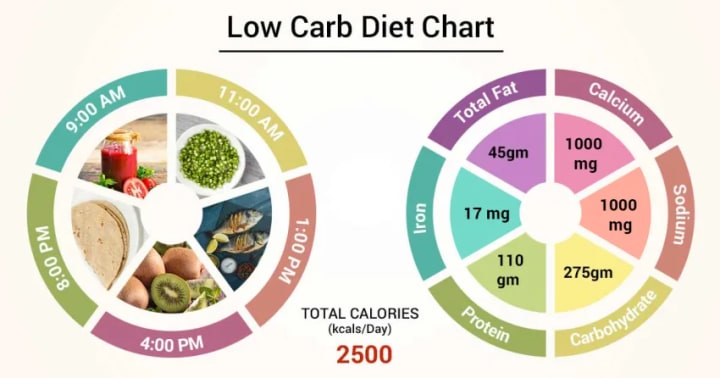
This involves reducing carbohydrate intake and increasing protein and/or fat intake. This can help regulate blood sugar and insulin levels, leading to weight loss.
A low-carbohydrate diet is a type of diet that involves reducing carbohydrate intake and increasing protein and/or fat intake. The goal of this diet is to shift the body's metabolism from primarily burning carbohydrates for energy to burning stored fat instead, which can lead to weight loss.
Examples of foods that are typically restricted on a low-carbohydrate diet include bread, pasta, rice, potatoes, and sugary foods like candy and soda. Instead, the diet may include foods like meat, fish, eggs, nuts, seeds, non-starchy vegetables, and healthy fats like olive oil and avocado.
By reducing carbohydrate intake, this diet can help regulate blood sugar and insulin levels. This is especially beneficial for people with type 2 diabetes or insulin resistance, as it can help improve insulin sensitivity and glycemic control. Additionally, a low-carbohydrate diet can help reduce hunger and cravings, which may make it easier to stick to the diet and achieve weight loss goals.
It's important to note that a low-carbohydrate diet may not be suitable for everyone, and it's important to consult with a healthcare professional before making significant changes to your diet.
Mediterranean diet:
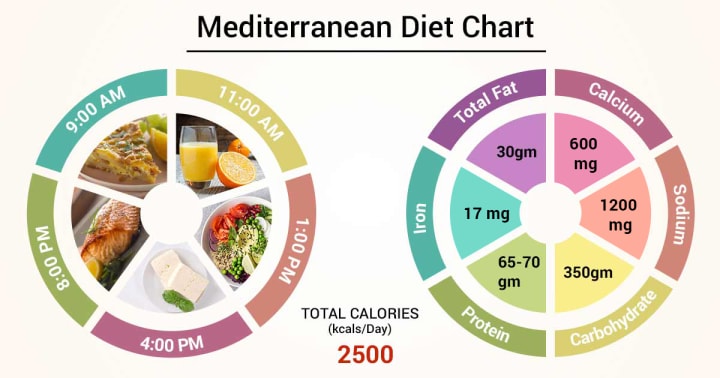
This is a balanced diet that emphasizes whole foods such as fruits, vegetables, whole grains, lean proteins, and healthy fats. It has been shown to promote weight loss and improve overall health.
The Mediterranean diet is a balanced diet that emphasizes whole foods such as fruits, vegetables, whole grains, lean proteins, and healthy fats. It's based on the traditional dietary patterns of countries surrounding the Mediterranean Sea, including Greece, Italy, and Spain.
Examples of foods that are typically included in the Mediterranean diet include:
Fruits and vegetables: Apples, oranges, berries, tomatoes, cucumbers, broccoli, spinach, kale, etc.
Whole grains: Brown rice, whole wheat bread, quinoa, barley, etc.
Lean proteins: Fish, chicken, turkey, beans, lentils, etc.
Healthy fats: Olive oil, nuts, seeds, avocado, etc.
Herbs and spices: Garlic, basil, oregano, thyme, etc.
The Mediterranean diet has been shown to promote weight loss and improve overall health. This is likely due to the diet's emphasis on whole, nutrient-dense foods and its relatively low intake of processed foods and added sugars. Additionally, the Mediterranean diet is rich in healthy fats and fiber, which can help promote feelings of fullness and reduce cravings.
It's important to note that the Mediterranean diet is not a strict set of rules, but rather a general pattern of eating. It can be adapted to fit individual preferences and dietary needs. Consulting a registered dietitian can help create a personalized Mediterranean diet plan.
Intermittent fasting:
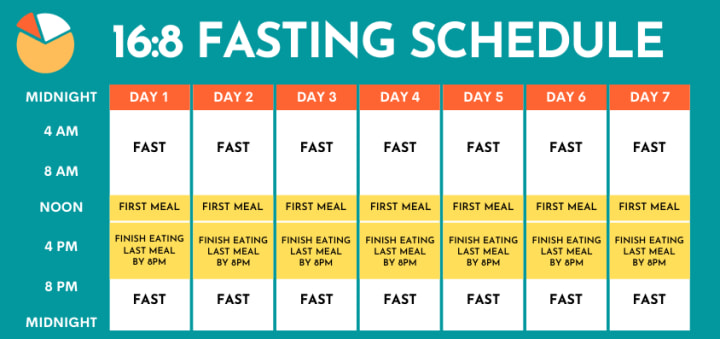
This involves alternating periods of fasting with periods of normal eating. This can help reduce overall calorie intake and promote weight loss.
Intermittent fasting is a type of eating pattern that involves alternating periods of fasting with periods of normal eating. The most common approach is too fast for a certain number of hours per day or week, followed by a period of normal eating.
One example of intermittent fasting is the 16/8 method, where an individual fasts for 16 hours each day and eats during an 8-hour window.
Another example is the 5:2 diet, where an individual eats normally for 5 days of the week and restricts calorie intake to 500-600 calories for the other 2 days.
Intermittent fasting can help reduce overall calorie intake and promote weight loss by creating a calorie deficit. By limiting the hours in which an individual can eat, they may naturally consume fewer calories. Additionally, fasting can help regulate insulin levels and promote fat burning, which can further aid in weight loss.
It's important to note that intermittent fasting may not be suitable for everyone, and it's important to consult with a healthcare professional before starting any fasting regimen. It's also important to ensure that the diet during the normal eating periods is still balanced and provides all necessary nutrients.
It's important to note that there is no one-size-fits-all diet plan, and it's always best to consult with a healthcare professional or registered dietitian to determine what type of diet plan would be most effective and safe for an individual.
Effective Ways to Manage Obesity: From Diets to Surgery and Exercise
These weight loss methods including the keto diet, smoothie diet, natural diet, yoga, medications, bariatric surgery, and exercise are effective ways to lose weight and improve overall health, but it's important to find the best approach for each individual's unique needs and lifestyle.
Keto Diet To Lose Weight
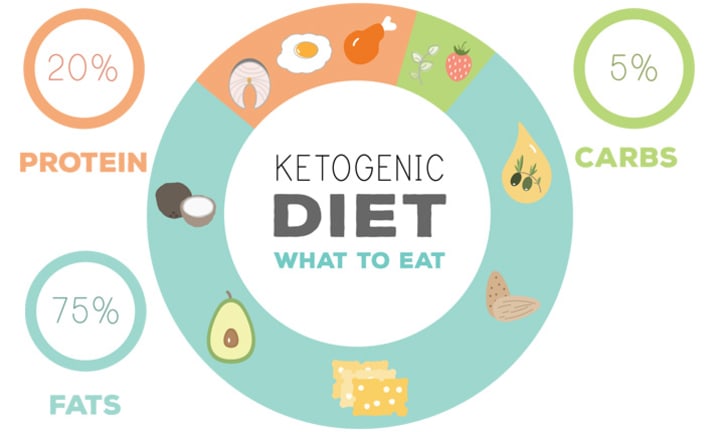
The ketogenic diet, or "keto" for short, is a high-fat, low-carbohydrate diet that is designed to shift the body into a metabolic state called ketosis. In this state, the body burns fat for fuel instead of carbohydrates.
The diet typically consists of 75% fat, 20% protein, and 5% carbohydrates. This means that foods high in fat such as meat, dairy, nuts, and oils are emphasized, while foods high in carbohydrates such as bread, pasta, and sugar are limited.
The goal of the diet is to enter a state of ketosis, where the body begins to break down stored fat into molecules called ketones, which are then used as energy. This can lead to significant weight loss, as well as improved blood sugar control and decreased inflammation.
However, the diet can be difficult to maintain and may not be appropriate for everyone, especially those with certain medical conditions. It's important to consult with a healthcare professional before starting a ketogenic diet and to ensure that the diet is nutritionally balanced and sustainable for the long term.
Smoothie Diet To Lose Weight

The smoothie diet is a type of weight loss diet that involves replacing one or more meals per day with nutrient-dense smoothies. These smoothies typically include a combination of fruits, vegetables, protein powder, and healthy fats.
The idea behind the diet is that the smoothies are low in calories and high in nutrients, which can help promote weight loss while still providing essential vitamins and minerals. Some proponents of the smoothie diet also claim that it can help reduce inflammation and improve digestion.
However, it's important to note that while smoothies can be a healthy addition to a balanced diet, they should not be the only source of nutrition. It's important to ensure that the smoothies are nutritionally balanced and contain enough protein and healthy fats to keep you feeling full and satisfied.
Additionally, the smoothie diet may not be appropriate for everyone, especially those with certain medical conditions. It's important to consult with a healthcare professional before starting any new diet or weight loss program.
Natural Diet To Lose Weight

A natural diet for weight loss emphasizes whole, minimally processed foods that are rich in nutrients and low in calories. This type of diet typically includes a variety of fruits, vegetables, whole grains, lean proteins, and healthy fats.
One of the main principles of a natural diet for weight loss is to focus on nutrient-dense foods, meaning they provide a high amount of nutrients for a low amount of calories. This can help promote weight loss while still providing essential vitamins and minerals.
Some examples of foods that are commonly included in a natural diet for weight loss include leafy greens, berries, nuts, and seeds, whole grains, lean proteins such as chicken and fish, and healthy fats such as olive oil and avocado.
In addition to emphasizing whole, natural foods, a natural diet for weight loss also involves avoiding or limiting processed foods, sugary drinks, and high-calorie snacks.
It's important to note that while a natural diet can be a healthy and effective way to lose weight, it may not be appropriate for everyone, especially those with certain medical conditions. It's always best to consult with a healthcare professional or registered dietitian to determine what type of diet would be most effective and safe for an individual.
Yoga To Lose Weight
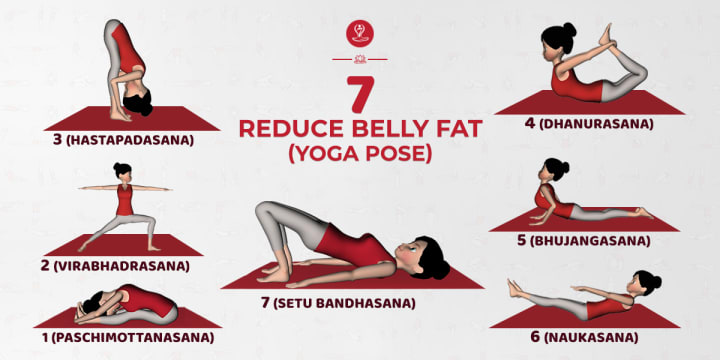
Yoga is a type of physical activity that can be used as part of a weight loss plan. It involves a series of postures, breathing exercises, and meditation, and can help promote relaxation, reduce stress, and improve overall health and well-being.
While yoga is not a high-intensity exercise like running or weightlifting, it can still be an effective way to lose weight. Yoga can help increase strength and flexibility, which can lead to improved fitness and weight loss over time. Additionally, certain types of yoga such as power yoga or hot yoga can be more physically challenging and may burn more calories than traditional yoga classes.
Yoga can also help reduce stress and improve sleep, which can indirectly contribute to weight loss. Stress and poor sleep have been linked to increased food cravings and overeating, so by reducing stress and improving sleep, yoga may help control appetite and promote healthier eating habits.
It's important to note that while yoga can be a valuable tool for weight loss, it should be used in combination with a healthy diet and other forms of exercise. It's always best to consult with a healthcare professional before starting any new exercise program, especially if you have any medical conditions or concerns.
Medications To Lose Weight

There are medications available that are designed to aid in weight loss, but they should only be used under the guidance of a healthcare professional.
One type of medication used for weight loss is appetite suppressants, which work by reducing feelings of hunger and increasing feelings of fullness. These medications are typically prescribed for short-term use and are not intended to be used as a long-term solution for weight loss.
Another type of medication used for weight loss is lipase inhibitors, which work by blocking the absorption of dietary fat in the digestive tract. This can lead to reduced calorie intake and weight loss over time.
While these medications can be effective for some people, they also come with potential side effects and risks. It's important to talk to a healthcare professional about the potential risks and benefits of weight loss medications before starting any treatment.
Additionally, weight loss medications should always be used in combination with a healthy diet and regular exercise for the best results. It's important to focus on lifestyle changes rather than relying solely on medication for weight loss.
Bariatric Surgery To Lose Weight
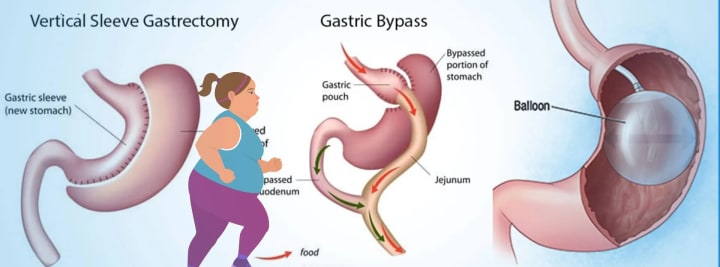
Bariatric surgery is a type of weight loss surgery that involves modifying the digestive system to help people lose weight. This type of surgery is typically recommended for people who have a body mass index (BMI) of 40 or higher, or for people with a BMI of 35 or higher who have other obesity-related health conditions such as diabetes or high blood pressure.
There are several types of bariatric surgery, including gastric bypass, sleeve gastrectomy, and adjustable gastric banding. Each type of surgery involves different modifications to the digestive system, but all are designed to help reduce the amount of food that can be eaten and absorbed by the body.
Bariatric surgery can lead to significant weight loss and improvement in obesity-related health conditions such as type 2 diabetes and high blood pressure. However, it also comes with potential risks and side effects, including infection, bleeding, and nutritional deficiencies.
The cost of bariatric surgery can vary greatly depending on the location, type of surgery, and individual factors such as insurance coverage. However, on average, bariatric surgery in the United States can range from $20,000 to $35,000, in Europe from €6,000 to €15,000, in Canada from CAD $10,000 to CAD $20,000, in Australia from AUD $17,000 to AUD $25,000, and India from INR 2,50,000 to INR 5,00,000. It's important to note that these are approximate costs and can vary significantly based on individual factors.
It's important to note that bariatric surgery is not a "quick fix" for weight loss and should only be considered after other weight loss methods, such as diet and exercise, has been tried without success. Additionally, bariatric surgery requires significant lifestyle changes and ongoing follow-up care to ensure long-term success. It's important to talk to a healthcare professional about the potential risks and benefits of bariatric surgery before making a decision.
Exercise To Lose Weight

Exercise is a critical component of any weight loss plan. When you exercise, your body burns calories, which can help create a calorie deficit and promote weight loss.
Many different types of exercise can be effective for weight loss, including cardio, strength training, and high-intensity interval training (HIIT). Cardio exercises such as running, cycling, or swimming can help burn calories and improve cardiovascular health, while strength training can help build muscle and increase metabolism.
HIIT workouts involve short bursts of intense exercise followed by periods of rest and can be an effective way to burn calories in a shorter amount of time. Additionally, incorporating physical activity into your daily routine, such as taking the stairs instead of the elevator or going for a walk after dinner, can also help promote weight loss.
It's important to find an exercise routine that you enjoy and that fits your lifestyle. Consistency is key when it comes to exercise and weight loss, so finding a routine that you can stick with is crucial.
It's also important to note that exercise should be used in combination with a healthy diet for the best weight loss results. Additionally, it's important to consult with a healthcare professional before starting any new exercise program, especially if you have any medical conditions or concerns.
Ayurveda To Lose Weight

Ayurveda is an ancient Indian system of medicine that emphasizes a holistic approach to health and wellness, including weight loss. Ayurvedic practitioners use a combination of diet, exercise, herbal remedies, and lifestyle changes to help individuals achieve a healthy weight. Some popular Ayurvedic weight loss remedies include drinking warm water with lemon and honey, incorporating spices like turmeric and cumin into meals, and practicing yoga and meditation to reduce stress. It's important to note that while Ayurvedic remedies have benefits for weight loss, it's always best to consult with a qualified Ayurvedic practitioner before beginning any new treatment or regimen.
Herbs To Lose Weight

Many herbs are believed to aid in weight loss, such as green tea, ginger, cinnamon, cayenne pepper, and ginseng. These herbs may help to boost metabolism, reduce appetite, and increase fat burning. However, it is important to note that herbs alone are not a magic solution for weight loss, and a healthy diet and regular exercise are still crucial for achieving long-term weight loss goals. It is also important to talk to a healthcare provider before taking any new herbs or supplements, especially if you have any medical conditions or are taking medications.
Chinese or Japanese Way To Lose Weight

In traditional Chinese and Japanese medicine, weight loss is approached through a holistic view of the body and its connections to the environment. Acupuncture, herbal remedies, and dietary therapy are often used to support weight loss goals. These practices aim to balance the body's energy or "qi" and promote healthy digestion and metabolism. Additionally, mindful eating and movement practices like tai chi and qigong are often recommended to support weight loss and overall well-being.
Acupuncture to lose weight

Acupuncture, a traditional Chinese medicine technique, is believed to help with weight loss by stimulating specific points in the body associated with digestion, metabolism, and appetite. The practice involves the insertion of fine needles into these points to help rebalance the body’s energy flow and potentially reduce cravings, suppress appetite, and improve digestion. While research on acupuncture for weight loss is still limited, some studies have shown promising results in terms of reduced BMI and waist circumference. However, it’s important to note that acupuncture should be used in conjunction with a healthy diet and regular exercise for the best results.
Side Effects of Weight Loss Program

Weight loss programs can have both positive and negative side effects. Some potential side effects of weight loss programs include:
- Hunger and cravings: When you start a weight loss program, you may experience increased hunger and cravings as your body adjusts to eating fewer calories.
- Fatigue: Some people may experience fatigue and decreased energy levels when following a weight loss program, particularly if they are not getting enough nutrients or calories.
- Nutrient deficiencies: Depending on the type of weight loss program you follow, you may be at risk of nutrient deficiencies if you are not consuming a balanced diet.
- Mood changes: Rapid weight loss can sometimes lead to mood changes, including irritability and depression.
- Muscle loss: If you are not getting enough protein or are engaging in excessive cardio exercise, you may lose muscle mass along with fat.
- Digestive issues: Some people may experience digestive issues such as constipation or diarrhea when starting a weight loss program.
- Gallstones: Rapid weight loss can increase your risk of developing gallstones, particularly if you are losing weight quickly or following a very low-calorie diet.
It's important to consult with a healthcare professional before starting any weight loss program to discuss potential side effects and ensure it's safe for you to do so. Additionally, following a balanced diet and incorporating regular exercise can help mitigate some of these side effects.
Precautions After a Successful Weight Loss Program
Here are some precautions to keep in mind to maintain your weight loss and overall health:
- Don't stop exercising: Regular exercise helps maintain weight loss and promotes overall health. Continue with a consistent exercise routine, aiming for at least 30 minutes of moderate activity most days of the week.
- Keep a food diary: Tracking your food intake can help you stay accountable and avoid slipping back into old habits. It also allows you to identify any areas where you may need to adjust your eating habits.
- Maintain a balanced diet: Focus on eating a variety of nutrient-dense foods, including fruits, vegetables, whole grains, lean protein, and healthy fats. Avoid highly processed foods and limit your intake of added sugars and saturated fats.
- Don't skip meals: Skipping meals can lead to overeating later in the day and make it more difficult to maintain weight loss. Stick to a regular eating schedule that includes three balanced meals and snacks as needed.
- Get enough sleep: Lack of sleep can disrupt hormones that regulate hunger and satiety, making it harder to control food cravings. Aim for 7-8 hours of sleep each night.
- Monitor your weight: Regularly monitoring your weight can help you catch any weight gain early and make adjustments to your diet and exercise routine as needed.
Remember that maintaining a weight loss is a lifelong journey, and it's important to stay committed to healthy habits even after reaching your goal weight.
Conclusions
In this article, I have covered a variety of topics related to weight loss and obesity. I have highlighted the prevalence of obesity around the world, the health risks associated with being overweight, and the various methods and strategies available for losing weight. These include diet plans such as keto and smoothie diets, natural and whole foods-based diets, medications, bariatric surgery, exercise, and yoga. Additionally, numerous preventative measures can be taken to address the global obesity epidemic, including promoting healthy eating habits, regular exercise, and public awareness campaigns. Despite the challenges posed by rising rates of obesity, there are steps that individuals and communities can take to improve their health and reduce their risk of obesity-related health problems.
FAQs
Q: What is obesity and why is it a concern?
A: Obesity is a condition characterized by excess body fat. It is a major health concern because it increases the risk of numerous health problems, including heart disease, stroke, diabetes, and cancer.
Q: What are some effective strategies for losing weight?
A: Effective weight loss strategies include making dietary changes such as following a whole foods-based or low-carb diet, exercising regularly, and getting enough sleep. Additionally, some people may benefit from medications or bariatric surgery.
Q: How can obesity be prevented?
A: Obesity can be prevented through a combination of healthy eating habits and regular exercise. It is also important to limit the consumption of processed foods and sugary beverages, as well as to avoid smoking and excessive alcohol consumption.
Q: Is obesity a global problem?
A: Yes, obesity is a global problem. Rates of obesity are rising rapidly around the world, particularly among children and in lower-income countries. The World Obesity Federation predicts that more than 4 billion people, or 51% of the world's population, will be obese or overweight within the next 12 years.
Q: What are the health risks associated with obesity?
A: The health risks associated with obesity include heart disease, stroke, diabetes, cancer, joint problems, and mental health issues. People with obesity are also more likely to be hospitalized for COVID-19.
Q. What is the most effective way to lose weight?
A. There is no one-size-fits-all answer to this question as the most effective way to lose weight depends on an individual's unique body and lifestyle. Some effective ways to lose weight include following a healthy diet plan, engaging in regular physical activity, and getting enough sleep.
Q. How long does it take to lose weight?
A. The amount of time it takes to lose weight varies from person to person and depends on factors such as starting weight, diet, exercise routine, and overall health. A safe and healthy rate of weight loss is 1-2 pounds per week.
Q. Can I lose weight without exercise?
A. Yes, it is possible to lose weight without exercise by following a healthy diet plan that creates a calorie deficit. However, incorporating regular physical activity into your routine can help speed up weight loss and improve overall health.
Q. What is considered a healthy BMI?
A. A BMI (body mass index) between 18.5 and 24.9 is considered healthy. A BMI of 25 or higher is considered overweight, and a BMI of 30 or higher is considered obese.
Q. Can genetics affect weight loss?
A. Yes, genetics can play a role in weight loss. Some individuals may have a genetic predisposition to obesity or have a slower metabolism, making it more challenging to lose weight. However, a healthy diet and regular exercise can still lead to successful weight loss, regardless of genetic factors.
Q. Are weight loss supplements safe and effective?
A. Not all weight loss supplements are safe or effective. It's important to talk to a healthcare professional before starting any weight loss supplement and to do research on the safety and effectiveness of the specific product. In general, a healthy diet and regular exercise are the most effective and safe ways to lose weight.
About the Creator
MANOJ KUMAR
Never Stop Dreaming: A true inspiration for anyone looking to turn their dreams into reality. From a humble background to a millionaire, my journey is a testament to the power of hard work, dedication, and an unbreakable spirit


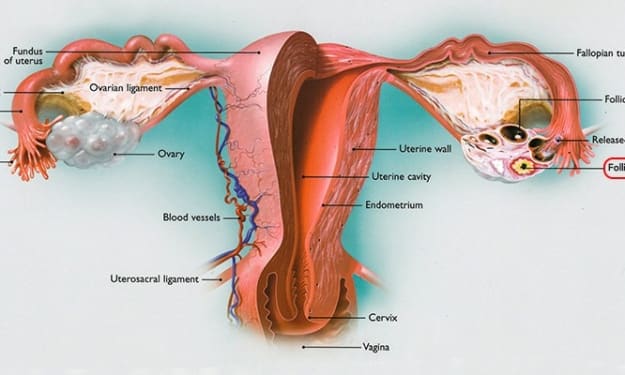



Comments
There are no comments for this story
Be the first to respond and start the conversation.